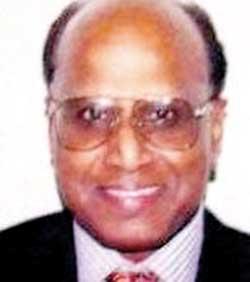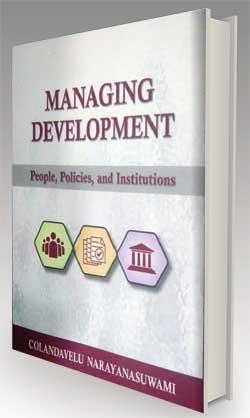Reply To:
Name - Reply Comment
 The book incorporates the extensive knowledge and experience in the areas of governance, institution building, agricultural and rural development, and monitoring C. Narayanasuwami, the author of the book titled Managing Development; People, Policies and Institutions, sat the Ceylon Civil Service Examination in 1960 when over 200 graduates sat. He was one of only 8 graduates who were selected to the Ceylon Civil Service. The Ceylon Civil Service was set up during the colonial period and continued for some years after independence. Many members of the Service enjoyed a reputation of a high level of competence in whatever positions to which they were appointed. The author had served in various positions, including that of District Government Agent, Deputy Director, Ministry of Agriculture and Lands, Director, Agrarian Research and Training Institute and thereafter as Additional Permanent Secretary of a Ministry dealing with Agriculture and Rural Development.
The book incorporates the extensive knowledge and experience in the areas of governance, institution building, agricultural and rural development, and monitoring C. Narayanasuwami, the author of the book titled Managing Development; People, Policies and Institutions, sat the Ceylon Civil Service Examination in 1960 when over 200 graduates sat. He was one of only 8 graduates who were selected to the Ceylon Civil Service. The Ceylon Civil Service was set up during the colonial period and continued for some years after independence. Many members of the Service enjoyed a reputation of a high level of competence in whatever positions to which they were appointed. The author had served in various positions, including that of District Government Agent, Deputy Director, Ministry of Agriculture and Lands, Director, Agrarian Research and Training Institute and thereafter as Additional Permanent Secretary of a Ministry dealing with Agriculture and Rural Development.
In recognition of his exceptional competence, he was appointed as the Director of a newly established Agrarian Research & Training Institute in Colombo. He established the necessary physical and intellectual infrastructure of that Institute and built it up to international standards. His contribution was never forgotten by the authorities because, when he was serving years later in the Asian Development Bank, Manila, one of the halls of the Institute was named after him. It is a very rare recognition by the government.
The reputation the author had built up, led him to a career in the Food & Agriculture Organization of the United Nations, as Project Development & Project Evaluation Specialist and Chief Technical Adviser of a Project in the Ministry of Agrarian Reform, Philippines.
He later served in the Asian Development Bank in the Philippines, where he last held a Director level position in one of the key divisions of ADB. The membership of the Bank then extended to 66 countries in the Asia & Pacific Region. After serving the Bank for 13 years, he is now functioning as an Independent Consultant of the ADB, AusAID, UNDP & the World  Bank. His remarkable career explains the knowledge and experience he has acquired as revealed in this book.
Bank. His remarkable career explains the knowledge and experience he has acquired as revealed in this book.
Part 1 of the book deals with Governance. The author emphasizes the fact that good governance is the most important criterion for sound development management. He compares the practice in many developed countries where public managers are held accountable for results unlike in
developing countries.
He also refers to lack of propriety and impartiality in the discharge of functions in developing countries but refers to some progress made in Sri Lanka by recent amendments to the Constitution. The discussion of other factors relevant to good governance makes interesting reading.
Part 2 relates to the Institutional Building for Development. The author defines it as “increasing the ability of an institution to formulate practicable development objectives and to meet them while making full use of its human, financial and other resources. He states that this has been an area of concern for half a century in the Asia and Pacific Region. He refers to the various methods adopted by the ADB to improve the institutional capacities of its member countries.
Part 1 of the book deals with Governance. The author emphasizes the fact that good governance is the most important criterion for sound development management. He compares the practice in many developed countries where public managers are held accountable for results unlike in developing countries.
Part 3 refers to Agrarian Reform and Rural Development. The author states that agrarian reform has been a key element of agricultural and rural development programmes in many developing countries in the Asia and Pacific region. He refers to the success in these areas by countries like Japan, the Republic of Korea and Taipei, China. He refers to the significant  part played by him as the first Director of the Agrarian Research and Training Institute in Sri Lanka to achieve the level of international recognition. He also refers to the reasons for the serious constraints encountered by developing countries in implementing rural development programmes.
part played by him as the first Director of the Agrarian Research and Training Institute in Sri Lanka to achieve the level of international recognition. He also refers to the reasons for the serious constraints encountered by developing countries in implementing rural development programmes.
Part 4 deals with Monitoring and Evaluation. He outlines the “Basic Concepts and Issues in Project Monitoring and Evaluation”. The author states:
“Setting up an appropriate management system, including a properly designed monitoring system, serves as an important tool for measuring performance to ensure that scarce resources of developing countries are put to effective use and that planned objectives are realized as envisaged at project design”.
Quite logically, he later states that evaluation “Seeks to find out whether a programme or a project activity is being implemented according to set guidelines and goals”.
He also outlines the steps initiated to improve evaluation capacity development in the member countries of ADB and presents various interesting papers presented at regional seminars-workshops in the areas of performance management and feedback mechanisms.
In conclusion, I must state that this book incorporates the extensive knowledge and experience the author has imbibed over a period of over 40 years in subjects of contemporary relevance, more specifically in the areas of governance, institution building, agricultural and rural development, and monitoring and evaluation which are playing a crucial role in development management in many developing countries today.
The thoughts, insights and critical analyses are invaluable not only to those involved in development management but also to those engaged in other fields of management, as many of the criteria vital to the success of development projects are equally applicable to success in other fields of management.
Shiva Pasupati LL.B (Ceylon), Post Graduate Diploma in International Law (Cambridge), President’s Counsel, Attorney General of Sri Lanka (1975 to 1988).